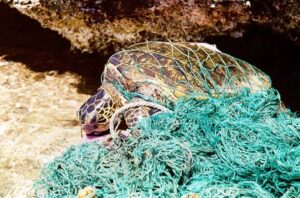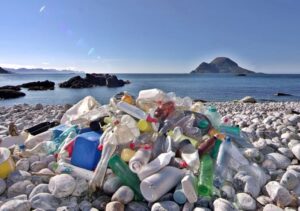Marine debris
Marine debris, also known as marine litter, is human-created waste that has deliberately or accidentally been released in a sea or ocean. Floating oceanic debris tends to accumulate at the center of gyres and on coastlines, frequently washing aground, when it is known as beach litter or tidewrack. Deliberate disposal of wastes at sea is called ocean dumping. Naturally occurring debris, such as driftwood and drift seeds, are also present. With the increasing use of plastic, human influence has become an issue as many types of (petrochemical) plastics do not biodegrade quickly, as would natural or organic materials. The largest single type of plastic pollution (~10 %) and majority of large plastic in the oceans is discarded and lost nets from the fishing industry. Waterborne plastic poses a serious threat to fish, seabirds, marine reptiles, and marine mammals, as well as to boats and coasts. Learn more
Ghost net

Ghost nets are fishing nets that have been abandoned, lost or otherwise discarded in the ocean. These nets, often nearly invisible in the dim light, can be left tangled on a rocky reef or drifting in the open sea. They can entangle fish, dolphins, sea turtles, sharks, dugongs, crocodiles, seabirds, crabs, and other creatures, including the occasional human diver. Acting as designed, the nets restrict movement, causing starvation, laceration and infection, and suffocation in those that need to return to the surface to breathe. It’s estimated that around 48,000 tons of ghost nets are generated each year, and these may linger in the oceans for a considerable time before breaking-up. Learn more
Marine plastic pollution
 Oceans are polluted by plastic particles ranging in size from large original material such as bottles and bags, down to microplastics formed from the fragmentation of plastic material. This material is only very slowly degraded or removed from the ocean so plastic particles are now widespread throughout the surface ocean and are known to be having deleterious effects on marine life. Discarded plastic bags, six pack rings, cigarette butts and other forms of plastic waste which finish up in the ocean present dangers to wildlife and fisheries. It is estimated that there is a stock of 86 million tons of plastic marine debris in the worldwide ocean as of the end of 2013, assuming that 1.4% of global plastics produced from 1950 to 2013 has entered the ocean and has accumulated there. It is estimated that 19–23 million tonnes of plastic leaks into aquatic ecosystems annually. The 2017 United Nations Ocean Conference estimated that the oceans might contain more weight in plastics than fish by the year 2050. Learn more
Oceans are polluted by plastic particles ranging in size from large original material such as bottles and bags, down to microplastics formed from the fragmentation of plastic material. This material is only very slowly degraded or removed from the ocean so plastic particles are now widespread throughout the surface ocean and are known to be having deleterious effects on marine life. Discarded plastic bags, six pack rings, cigarette butts and other forms of plastic waste which finish up in the ocean present dangers to wildlife and fisheries. It is estimated that there is a stock of 86 million tons of plastic marine debris in the worldwide ocean as of the end of 2013, assuming that 1.4% of global plastics produced from 1950 to 2013 has entered the ocean and has accumulated there. It is estimated that 19–23 million tonnes of plastic leaks into aquatic ecosystems annually. The 2017 United Nations Ocean Conference estimated that the oceans might contain more weight in plastics than fish by the year 2050. Learn more
Strategies to remove marine litter
Find out more about how to reduce marine pollution and what our contribution is as specialist divers under Strategies.
[paypal-donation]
